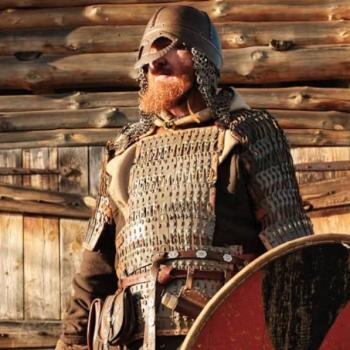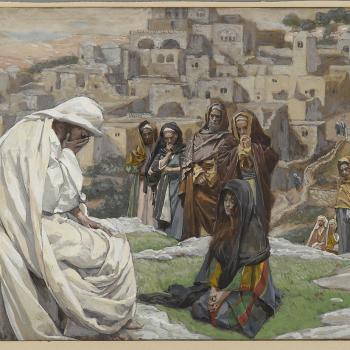 Israelites may once have practiced human sacrifice, but that changed. This post looks for hints of that change in the story of Abraham and Isaac and asks some questions about any sacrificing to God.
Israelites may once have practiced human sacrifice, but that changed. This post looks for hints of that change in the story of Abraham and Isaac and asks some questions about any sacrificing to God.
Episode 8 of the Rowing with Michael Series: A journey through the Jewish/Christian Scriptures in Verse and Commentary. Introduction and Contents for this series HERE.
Michael, row the boat ashore. Alleluia….
- Abe heard voices from the sky. Alleluia.
- Said young Isaac had to die. Alleluia.
- When they reached the mountaintop, Alleluia.
- Another voice said, “Abraham, stop!” Alleluia.
In the Bible there are stories of religious human sacrifice that indicate that the practice may once have been accepted in early Israelite religion. Here is one such story, but I’m going to make it a little different. I’m getting help on this from James Alison. (Jesus, the Forgiving Victim, Essay 3, pp. 131-34)
An old man with only one heir hears a promise from God that he will be the ancestor of a great nation. God tests this old man’s faith by ordering him to sacrifice his only son on a mountain. The man takes wood for the holocaust and loads it onto his son’s back. Together they start up the mountain, the man carrying a knife and a pot with the fire, the son carrying the wood. On the way the son says, “Father, here are the wood and the fire, but where is the victim for the sacrifice?” “God will provide,” the old man replies.
At the top of the mountain the man builds an altar and binds his son on it. He takes the knife and kills his son. Then he sets fire to the wood and burns up his son’s body as an offering to God. Afterwards he descends the mountain alone.
In the familiar Bible story the father and son are Abraham and Isaac, and Isaac doesn’t die. Here it is in summary:
God orders Abraham to sacrifice his son on a mountain. This Abraham proceeds to do; but God intervenes at the last moment. A ram happens to be stuck in a briar bush, so they sacrifice the ram in place of Isaac. After the appropriate commendation from the Lord and a renewal of the promise God had made before, Abraham returns to where he left some servants and descends the mountain. (Genesis 22:1-19)
Notice that Isaac is not mentioned along with Abraham at the end of the story. That detail sets scholars like James Allison to wondering. Maybe we’re dealing here with a story that has undergone some editing. The original story may have been like what I described first. It would have taught that a god desires human sacrifice. Later an editor changed the story so that it would teach that Israel’s God does not desire human sacrifice. This editor changed what he thought he needed to but didn’t follow through consistently to the end of the story. Abraham still walks down the mountain alone. That apparent slip leads these scholars to suspect an editor’s hand was at work.
Great faith or misplaced faith?
From this story Paul drew a lesson about the importance of faith. One lesson that the story does not teach is what to think when a mysterious voice tells you to do something. A hallucinated voice from the sky sounds exactly like a real one. Abraham immediately went and attempted what his voice commanded without considering whether it was the right thing to do. And God commended him for it. That’s not a good example for us. I’d say, if Abraham really did hear such a voice, it couldn’t have been God’s. More to the point, I’m pretty sure it’s a made-up story.
A lesson people often take from this story is that God doesn’t approve of human sacrifice. That message would have come across to its hearers even more strongly if the story actually was edited as suggested above. Then the changes to the story would be what the editor had in mind to teach—and not a questionable history of people named Abraham and Isaac and a morally questionable command from God. It’s the edited version that made it into Scripture.
In this story we get the idea that God doesn’t want human sacrifice, but we can’t avoid the impression that God considers sacrificing something to be a good thing. The custom of offering sacrifices is a prominent feature of the Old Testament. What sense does it make for humans to offer sacrifice to God? Does God require repayment, even if only token repayment, for benefits given or offenses taken? That’s a common thought, but I have my doubts. What kind of giver would God be if repayment were required? When we make an offering to God, are we perhaps doing something else than paying back? This requires more attention.
Image credit: The Virtual Preacher











